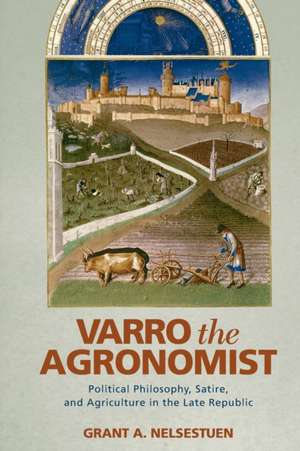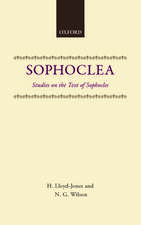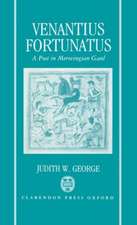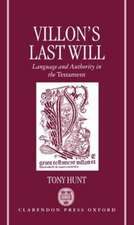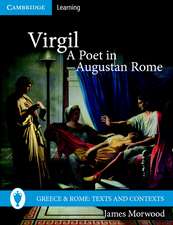Varro the Agronomist: Political Philosophy, Satire, and Agriculture in the Late Republic
Autor Grant A. Nelsestuenen Limba Engleză Paperback – 17 sep 2016
Some six years after his narrow escape from proscription in 43 bce, Marcus Terentius Varro, the “most learned” of the Romans, wrote a technical treatise on farming in the form of a satirico-philosophical dialogue. Grant A. Nelsestuen argues that far from simply being just another encyclopedic entry of a seemingly aloof antiquarian or offering an escapist’s retreat into rustication, Varro’s De Re Rustica uses the model of the farm to craft an implicitly political treatise that grapples with multifarious challenges facing the contemporary Roman world.
On one level, Varro’s treatise presents an innovative account of the Roman farm, which rationalizes new agricultural and pastoral opportunities for contemporary elite owners of large-scale estates. But on another level, this bold agronomical vision associates the farm’s different spheres with distinct areas under Roman control, thereby allegorizing Rome’s empire on the model of a farm. Nelsestuen argues that Varro’s treatise thus provides his contemporaries with a model for governing the Roman state, anticipates Augustus’ subsequent transformation of Roman dominion into a coherent territorial state, and offers an ancient theory of imperialism.
Shedding new light on the only completely extant work of a much-celebrated but ill-understood figure, Varro the Agronomist has much to offer to those interested in Latin literature—especially, Cicero and Vergil—as well as on the political dimensions of intellectual life in first-century bce Rome, ancient imperialism, and Roman political philosophy.
On one level, Varro’s treatise presents an innovative account of the Roman farm, which rationalizes new agricultural and pastoral opportunities for contemporary elite owners of large-scale estates. But on another level, this bold agronomical vision associates the farm’s different spheres with distinct areas under Roman control, thereby allegorizing Rome’s empire on the model of a farm. Nelsestuen argues that Varro’s treatise thus provides his contemporaries with a model for governing the Roman state, anticipates Augustus’ subsequent transformation of Roman dominion into a coherent territorial state, and offers an ancient theory of imperialism.
Shedding new light on the only completely extant work of a much-celebrated but ill-understood figure, Varro the Agronomist has much to offer to those interested in Latin literature—especially, Cicero and Vergil—as well as on the political dimensions of intellectual life in first-century bce Rome, ancient imperialism, and Roman political philosophy.
Preț: 285.84 lei
Nou
Puncte Express: 429
Preț estimativ în valută:
54.70€ • 56.99$ • 45.29£
54.70€ • 56.99$ • 45.29£
Carte tipărită la comandă
Livrare economică 03-17 aprilie
Preluare comenzi: 021 569.72.76
Specificații
ISBN-13: 9780814252215
ISBN-10: 0814252214
Pagini: 332
Dimensiuni: 152 x 229 x 23 mm
Greutate: 0.49 kg
Ediția:1
Editura: Ohio State University Press
Colecția Ohio State University Press
ISBN-10: 0814252214
Pagini: 332
Dimensiuni: 152 x 229 x 23 mm
Greutate: 0.49 kg
Ediția:1
Editura: Ohio State University Press
Colecția Ohio State University Press
Recenzii
“This book provides an original and compelling reading of an important and neglected work of classical Latin literature. The author is attentive to literary, philological, historical, cultural, and economic issues and produces a dazzling interpretation of Res Rusticae in its many contexts. It far surpasses previous work and establishes a model for approaching ‘technical’ writings as works of literature.”
—Thomas Habinek, University of Southern California
—Thomas Habinek, University of Southern California
Notă biografică
Grant A. Nelsestuen is Assistant Professor of Classics at the University of Wisconsin, Madison.
Cuprins
INTRODUCTION: From One Country House to Another
CHAPTER 1 • The Form and Genre of Varronian res rusticae
Philosophical Dialogue and the Form of the RR
Philosophical Satire in the RR
A Case Study of Parody and Irony in the RR
CHAPTER 2 • Creating the Agronomical Field of res rusticae
Sources and the Creation of a Roman Agronomical Tradition
Definition through the Dialectical Exchange in RR 1
Farming and Farmers, Cultura and Colo
Conclusion
CHAPTER 3 • Agri Cultura and the Italian Farm in RR 1
Italia and the Temple of Tellus
Patterns of Exemplification for Italian Agri Cultura
Exceptional “Exceptions” to RR 1’s Agricultural Exemplification
The Agripolitical Geography of Italia
The Death of Fundilius and the End of RR 1
CHAPTER 4 • The Song of Faustulus: Pastures and Provinces in RR 2
Staging the Dialogue
A Cast of Shepherds
A Vergilian Counterexample: Greek Shepherds in a Bucolic Italy
Epos and the Technical in RR 2
CHAPTER 5 • Provincial Pastures: The Amoebean Refrain of Romulus in RR 2
Scrofa and Varro as Military Herders of Men
Pairs of Paradigmatic Herdsmen: Eclogue 1 and RR 2
Animal Husbandry in Provincial Pastures
Conclusion
CHAPTER 6 • Tending the Villa of Rome in RR 3
The Villa-Still-Publica and the Shadows of Caesarian Dictatorship
Birdcages, Villas, and the Crapshoot of Pastio Villatica
Not Your Father’s Leporaria: Profit and Pleasure
Aviaries and the Failure of Elite Political Behavior
Bees and the Success of the Brothers Veianii
Epilogue
CHAPTER 7 • Varro’s Imperial Estate and Its Intellectual Contexts
Varro, His De Re Rustica, and Rome in 37 BC
Prior Roman Conceptions of Empire
Greek and Roman Intellectual Antecedents
Varro’s Conception of Imperium-as-Praedium
Conclusion: Some Final Thoughts on Varro and Modern Political Theory
CHAPTER 1 • The Form and Genre of Varronian res rusticae
Philosophical Dialogue and the Form of the RR
Philosophical Satire in the RR
A Case Study of Parody and Irony in the RR
CHAPTER 2 • Creating the Agronomical Field of res rusticae
Sources and the Creation of a Roman Agronomical Tradition
Definition through the Dialectical Exchange in RR 1
Farming and Farmers, Cultura and Colo
Conclusion
CHAPTER 3 • Agri Cultura and the Italian Farm in RR 1
Italia and the Temple of Tellus
Patterns of Exemplification for Italian Agri Cultura
Exceptional “Exceptions” to RR 1’s Agricultural Exemplification
The Agripolitical Geography of Italia
The Death of Fundilius and the End of RR 1
CHAPTER 4 • The Song of Faustulus: Pastures and Provinces in RR 2
Staging the Dialogue
A Cast of Shepherds
A Vergilian Counterexample: Greek Shepherds in a Bucolic Italy
Epos and the Technical in RR 2
CHAPTER 5 • Provincial Pastures: The Amoebean Refrain of Romulus in RR 2
Scrofa and Varro as Military Herders of Men
Pairs of Paradigmatic Herdsmen: Eclogue 1 and RR 2
Animal Husbandry in Provincial Pastures
Conclusion
CHAPTER 6 • Tending the Villa of Rome in RR 3
The Villa-Still-Publica and the Shadows of Caesarian Dictatorship
Birdcages, Villas, and the Crapshoot of Pastio Villatica
Not Your Father’s Leporaria: Profit and Pleasure
Aviaries and the Failure of Elite Political Behavior
Bees and the Success of the Brothers Veianii
Epilogue
CHAPTER 7 • Varro’s Imperial Estate and Its Intellectual Contexts
Varro, His De Re Rustica, and Rome in 37 BC
Prior Roman Conceptions of Empire
Greek and Roman Intellectual Antecedents
Varro’s Conception of Imperium-as-Praedium
Conclusion: Some Final Thoughts on Varro and Modern Political Theory
Descriere
Argues that Varro’s treatise provides his contemporaries with a model for governing the Roman state, anticipates Augustus’ transformation of Roman dominion into a coherent territorial state, and offers an ancient theory of imperialism.
